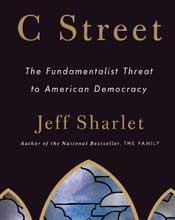I can't decide whether Jeff Sharlet's "C Street: The Fundamentalist Threat to American Democracy" (Little Brown, 2010, $27) is pulp nonfiction about a scholarly topic, or scholarly nonfiction about a pulp topic. It's hard to write a book that hinges so heavily on three extramarital affairs--those of Mark Sanford, Chip Pickering and John Ensign--without a hint of the tabloid, but Sharlet manages to do it by writing with a generous spirit that lets him find the humanity in these insecure and narcissistic men. That is, in fact, the book's main accomplishment: Sharlet looks at Washington fundamentalists' sacred self-image, contrasts it with their profane behavior and meets them at a halfway point of tragicomic human fallibility.
This is not to say that the book is just about the affairs. It covers a great deal of territory, with chapters on the history of C Street and the large, clandestine network of conservative D.C. politicians called "the Family" (first documented in Sharlet's previous book, "The Family: The Secret Fundamentalism at the Heart of American Power"); an account of how American fundamentalism helped create the Ugandan anti-gay, homosexual death-penalty bill (which the Ugandan Parliament ultimately rejected); and how fundamentalism influences U.S. military culture. But the affairs provide "C Street" with a narrative center of gravity around which all of these stories orbit and to which Sharlet consistently returns. I think the affairs really fascinate him because of the questions they raise about the C Street organization itself.
What's most remarkable about this book is that Sharlet actually answers these seemingly unanswerable questions in a way that speaks to more universal human concerns. Sharlet finds C Street frightening not because it's so strange, but because it's so normal.
"[A]s a subject of derision," he writes, "(C Street) reassures us that its excesses were departures from the norm"; however, the philosophy that C Street represents, "the idea that what we want is what God wants," is "one of the dominant sensibilities of our time."
All of us, in times of self-doubt, want guidance and a sense that we have a place in the world. Politicians tend to be the most desperate and insecure people-pleasers among us, and C Street offers them a toxic kind of self-worth. C Street counters the inner voices that tell these men they're worthless, and its answer is so loud that it drowns out the human conscience and suppresses human empathy. Politicians who accept the C Street narrative can more easily cheat on their wives or participate in bigotry or ignore collateral civilian casualties, because the C Street community has so strengthened their faith in themselves that they no longer feel the need to question their own decisions--in the halls of Congress, in its nearby bedrooms or anywhere else.
This book does not decisively rebut the fundamentalist political agenda, but I don't think it really intends to. It's a study of the psychology of American political fundamentalism, and the odd combination of free-market ethics and theocratic social-values legislation--the syncretic worship of God and Mammon--that defines it. It tells us who these people really are, and how they got that way, and, for the most part, it answers these questions by telling human stories that set us in front of a mirror and warn all of us to be very, very careful. It functions as an instructive meditation on how easy self-deception can become when we accept a narrative that feeds our psychological needs.
As a secular progressive, I expected to feel more righteous when I finished "C Street" than I did when I started. I am filled, instead, with a real fear that I, too, could become a proud and heartless man. The examples of Bill Clinton and John Edwards remind me that the American fundamentalist right wing has no monopoly on hypocrisy or heartless narcissism, and that we must all, in the words of Philippians 2:12, "work out (our) salvation with fear and trembling." I think that's the central message of the book, presented in a subtle and ingenious way.
Fighting the American fundamentalist policy agenda is, of course, a completely separate issue--and Sharlet does little to give us any idea of how we can do that, other than remembering that our adversaries in this struggle have human motivations. "C Street" is a solid read, a good history and an excellent meditation on the nature of pride. If you're just looking for talking points, you probably won't find them here.
My only point of contention with the book's historical narrative is that I believe it understates the role that the Cold War played in creating American political fundamentalism. The Family emerged in a political climate where the greatest danger to American democracy appeared to be that of communist secular states. It will be interesting to see how C Street changes as younger political leaders who came of age with no fear of the Soviet Union replace veterans of the movement.
Freelance writer Tom Head is a lifelong Jacksonian. He has authored or co-authored 24 nonfiction books on a wide range of topics, is a civil liberties writer for About.com and a grassroots progressive activist.



Comments
Use the comment form below to begin a discussion about this content.
comments powered by Disqus